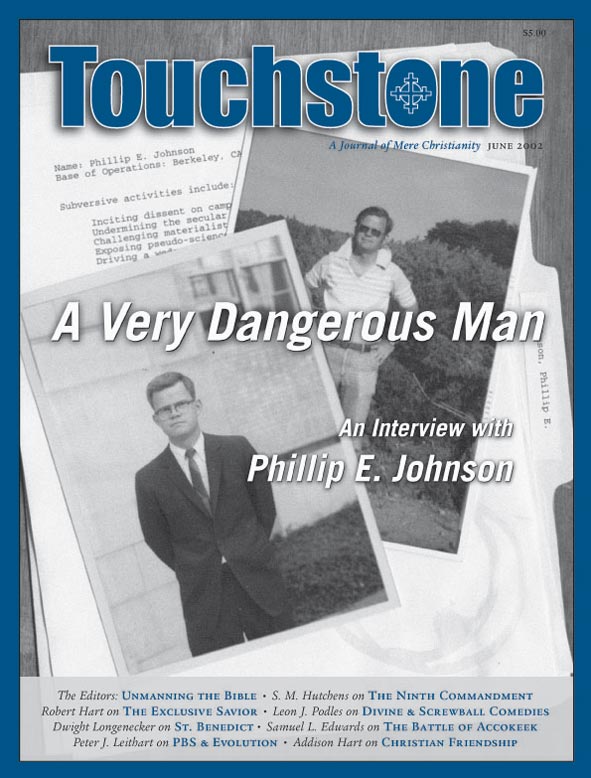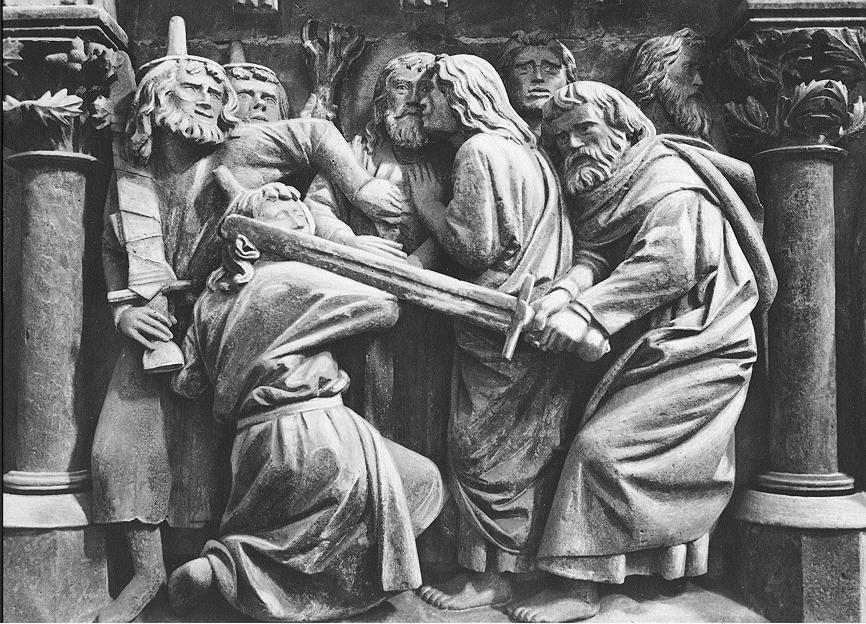Unmanning the Bible
The editorial “Heretical Bibles” in the April edition of Touchstone has predictably brought much response, both negative and positive. The letters in this issue from Mr. Hering and Drs. Moo and Padgett are typical of the former, and call for reply. Those who weary of our emphasis on this and related topics must understand that while we, too, would like to let them rest, the issues will not go away. We believe this to be the principal place of doctrinal engagement and defense in our day, where old errors are recrudescing in subtle and not-so-subtle modern forms, and against which the Church is called to engage as often as it is challenged. While this editorial is based specifically upon letters we have received, an excellent general explanation of “the necessary failure of inclusive language translations” by Fr. Paul Mankowski, “Jesus, Son of Humankind?” may be found in the October 2001 issue of Touchstone.
Mr. Hering and Dr. Moo have, each in his own way, accused us of uncharitableness, Hering because we have unkindly warned people away from finding God in the Bible or Bibles of their choice, Moo because we have wantonly scandalized the Church on a difference of opinion that does not touch the heart of Christian doctrine and upon which, therefore, earnest Christians should be allowed to disagree without suffering the disapproval of the Touchstone editors.
Moo’s reaction of deep offense as a translator of Today’s New International Version (TNIV) seems more reasonable than that of those who are willing to allow us our opinions as long as they can have theirs. He knows fighting words when he hears them, and therefore also, we presume, understands that what is at stake among those for whom this Bible is intended is nothing less than the division symbolized in his own cancelled subscription.
We doubt it is possible to identify people as abettors of heresy in a way that will sound charitable to them until they come to agree, so once again, we must go to the point. As the editorial and the history of our publishing on the subject indicate, we believe the egalitarian anthropology the wording of his translation supports does indeed lay violent hands on the heart of Christian doctrine, since it obscures and confuses headship in the human order that, according to St. Paul, directly reflects the Divine. This, we believe, is one of the principal points of attack in our generation against the orthodoxy Dr. Moo desires to uphold and defend. Because man is made in the image of God, bad anthropology is also bad theology. To misunderstand and misrepresent man is to misunderstand and misrepresent God.
We do not enjoy offending people, especially the decent kind of people that stand behind the letters written to us by our critics on this issue. We hoped the account of how far we forebear in our own publishing, identified by Dr. Moo as hypocrisy because we do not force our contributors to write exactly as we do, would serve as evidence of a reasonable and generous spirit. Apparently not. It is true, however, that we hold Bible translators to a higher standard than Touchstone contributors, and he is correct in thinking the editorial was aiming directly at, among others, the translators of the TNIV.
Dr. Padgett says we are being un-Christlike, and we presume this means that, like Mr. Hering and Dr. Moo, he is accusing us of uncharitableness, of treating sincere Christians badly by calling them terrible, false names, for which we should repent and give an apology to the innocents we have harmed. If things stand as he says they do in his digest of egalitarian conviction, however, the situation is even worse than that, for our un-Christlikeness amounts to belief in, and teaching of, a different Christ than his own.
Padgett’s Christ, the Christ of a rather large and influential new crop of Evangelical egalitarians, assumed a generic humanity that is equally a quality of men and women. This is found neither in Scripture nor in nature nor in Creed, but is the product of egalitarian re-imagination, read back into all three.
Padgett is right to point to the word anthropos as the token of the controversy, but very wrong in his Greek. The word as used in Scripture means “man” as English apart from egalitarian adjustment means man, as the Church has known man from its beginning, man as the proper title of the male as primary, comprehensive, and representative of the human race, something that can be seen even by readers of Bibles that have undergone egalitarian adjustment, whether or not they know the original languages. It pervades the narrative. One cannot rid the Bible of it by grammatical tinkering. It inheres as a fundamental structural element of the whole, there for rediscovery even if the egalitarians were wholly successful in their attempt to neuter biblical grammar. As we have observed many times, this is a commonplace of feminist theology, which, with unassailable reason, finds it necessary either to radically revise or to reject both Judaism and Christianity as hopelessly sexist from the creation narratives forward.
The egalitarian juggernaut breaks upon the rocks of the Bible’s very first chapter, from God’s seminal incursion into the formless and empty earth to the creation of a man like himself: “So God created man [ha’adam, LXX: anthropos] in his own image; in the image of God he created him; male and female he created them.” So it is carried on through the Scriptures and by those who follow them, the man as the defining member of the woman, of the Church, and of the race. Naturally, the egalitarians will not recognize the connections. They do not see why creating a male first, identifying humanity with his name, and then making a woman from him, whom he in turn names, should have any bearing on their doctrine. This failure to see and understand is the chief of their faults as would-be teachers of the Church. One cannot place women’s ordination or any other issue that involves divine order to the side in such matters. They are all connected, and intimately, to what is identified in the Pauline writings as the headship of the man over the woman, of Christ over the man, and of God over Christ—not an invention of St. Paul, but a prior teaching of Scripture rightly divined and re-delivered to the Church with apostolic force and authority.
This knowledge will be compromised for those who rely on these bad translations, for this is the very thing they deliberately obscure in accordance with egalitarian doctrine, and for which they should be decisively rejected. The Christian teaching, as dark and blighted as it is to the egalitarians, is that the maleness of particular men, not “humanness,” is the essence and sign of the inclusivity in which they claim to delight. There exists no generic quality of humanness apart from the particularity of Adam and Christ as the comprehensive men any more than there exists a generic Godness apart from the particularity of the Father as the Source of the Son and Spirit. God did not become human except in that he was “made man,” which means not simply made human, but made human only and in so far as he was made a particular male, and so able to comprehend all men (including female men) in his person as the “firstborn of all creation.”
As for all the blustering, the accusation that we are mere traditionalists attempting to force our tastes on the churches, that we are nasty and uncharitable and whatnot, these distractions were anticipated in the offending editorial and dealt with there. Even if true, they are small matters next to the issue at hand, which is doctrinal, and very grave. If I have any qualms of conscience, it is not in that we used the word heresy, which refers to false teaching and its effect on the Church, but that to avoid graver offense, stronger biblical terminology referring to the character, origin, and ends of such teaching has not been used. If in this avoidance we have erred, it is the same error of which we accuse those who do not identify departures from the Faith with appropriate words, or oppose them with sufficient vigor—a serious failing indeed.
S. M. Hutchens is a senior editor and longtime writer for Touchstone.
subscription options
Order
Print/Online Subscription

Get six issues (one year) of Touchstone PLUS full online access including pdf downloads for only $39.95. That's only $3.34 per month!
Order
Online Only
Subscription

Get a one-year full-access subscription to the Touchstone online archives for only $19.95. That's only $1.66 per month!
bulk subscriptions
Order Touchstone subscriptions in bulk and save $10 per sub! Each subscription includes 6 issues of Touchstone plus full online access to touchstonemag.com—including archives, videos, and pdf downloads of recent issues for only $29.95 each! Great for churches or study groups.
Transactions will be processed on a secure server.
more from the online archives
calling all readers
Please Donate
"There are magazines worth reading but few worth saving . . . Touchstone is just such a magazine."
—Alice von Hildebrand
"Here we do not concede one square millimeter of territory to falsehood, folly, contemporary sentimentality, or fashion. We speak the truth, and let God be our judge. . . . Touchstone is the one committedly Christian conservative journal."
—Anthony Esolen, Touchstone senior editor










